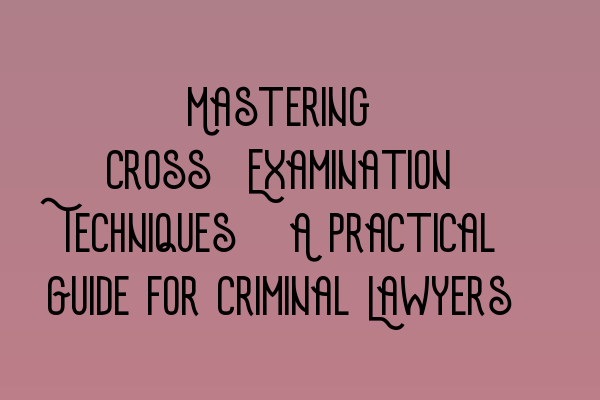Mastering Cross-Examination Techniques: A Practical Guide for Criminal Lawyers
Welcome to the SQE Criminal Law & Practice Law UK blog! In this article, we will explore the art of mastering cross-examination techniques, providing you with a practical guide to enhance your skills as a criminal lawyer.
Why is Cross-Examination Important?
Cross-examination is a critical aspect of criminal law proceedings. It provides an opportunity for lawyers to challenge the credibility and reliability of witnesses, test their testimony, and uncover any inconsistencies or biases that may exist. Effective cross-examination can make or break a case, as it allows lawyers to present alternative narratives, cast doubt on the prosecution’s case, and ultimately, secure a positive outcome for their clients.
Preparing for Cross-Examination
Before diving into the art of cross-examination, it is essential to lay a strong foundation through meticulous preparation. Start by thoroughly reviewing the witness’s statements, police reports, and any other relevant evidence. Identify key points that can be challenged or contradicted during cross-examination. Utilize our SQE 1 Practice Exam Questions and SQE 1 Practice Mocks FLK1 FLK2 to sharpen your legal knowledge and refine your questioning strategies.
The Art of Effective Cross-Examination
1. Control the Witness – Establish control over the witness by asking open-ended questions that require detailed answers. By maintaining control, you can steer the testimony in a direction that supports your case theory.
2. Use Leading Questions – Lead the witness towards the answers you want by using leading questions. These questions suggest the desired response and allow you to control the narrative without giving the witness an opportunity to elaborate or deviate.
3. Argue via Questions – Instead of making direct assertions, present your arguments through well-crafted questions. This technique forces the witness to answer in a way that supports your version of events.
Tips for Effective Cross-Examination
1. Listen Carefully – Pay close attention to the witness’s answers during cross-examination. Observe their body language, tone, and any signs of inconsistency or hesitation. These cues can be used to your advantage when attacking the witness’s credibility.
2. Be Prepared to Adapt – As cross-examination progresses, new information may surface, requiring you to adapt your line of questioning. Be flexible and ready to adjust your strategy on the fly.
3. Stay Calm and Confident – Maintaining a composed and confident demeanor is essential during cross-examination. Projecting an air of credibility and authority can influence the jury and strengthen your case.
Further Resources
To further enhance your cross-examination skills, consider enrolling in our SQE 2 Preparation Courses and SQE 1 Preparation Courses. These comprehensive programs will provide you with in-depth training, practical exercises, and expert guidance to excel in your legal career.
For more information about the SRA SQE exam dates, please visit our detailed guide on SRA SQE Exam Dates.
Mastering cross-examination techniques requires practice, dedication, and a deep understanding of criminal law principles. By implementing the strategies outlined in this guide and utilizing the valuable resources available, you can become an exceptional cross-examiner and elevate your performance as a criminal lawyer.
